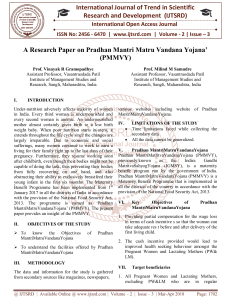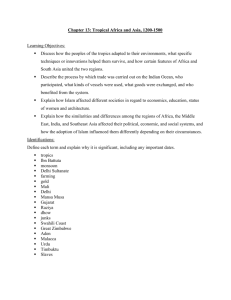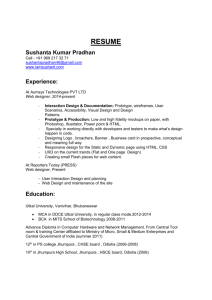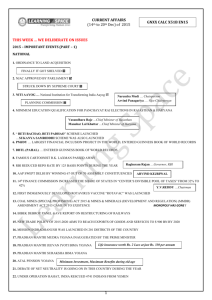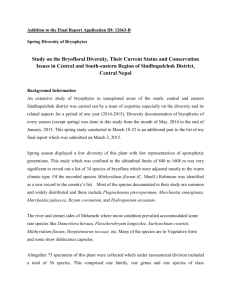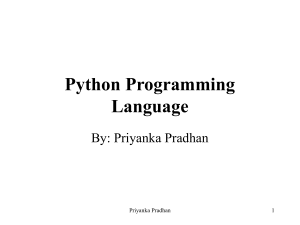Microsoft Word 2007
advertisement
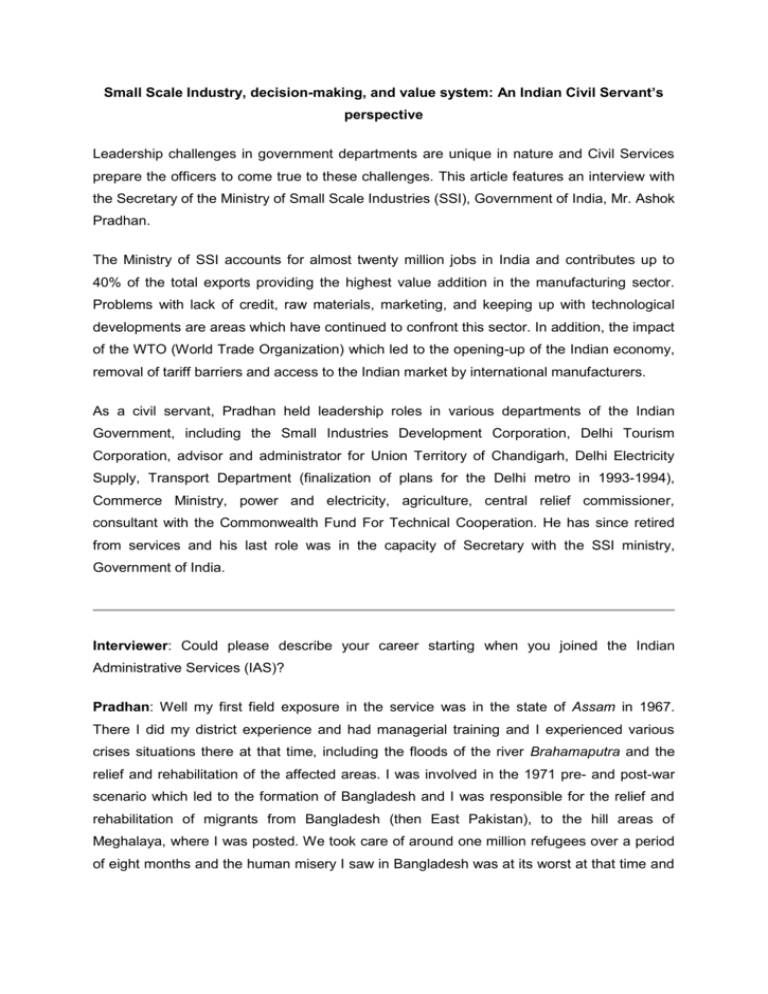
Small Scale Industry, decision-making, and value system: An Indian Civil Servant’s perspective Leadership challenges in government departments are unique in nature and Civil Services prepare the officers to come true to these challenges. This article features an interview with the Secretary of the Ministry of Small Scale Industries (SSI), Government of India, Mr. Ashok Pradhan. The Ministry of SSI accounts for almost twenty million jobs in India and contributes up to 40% of the total exports providing the highest value addition in the manufacturing sector. Problems with lack of credit, raw materials, marketing, and keeping up with technological developments are areas which have continued to confront this sector. In addition, the impact of the WTO (World Trade Organization) which led to the opening-up of the Indian economy, removal of tariff barriers and access to the Indian market by international manufacturers. As a civil servant, Pradhan held leadership roles in various departments of the Indian Government, including the Small Industries Development Corporation, Delhi Tourism Corporation, advisor and administrator for Union Territory of Chandigarh, Delhi Electricity Supply, Transport Department (finalization of plans for the Delhi metro in 1993-1994), Commerce Ministry, power and electricity, agriculture, central relief commissioner, consultant with the Commonwealth Fund For Technical Cooperation. He has since retired from services and his last role was in the capacity of Secretary with the SSI ministry, Government of India. Interviewer: Could please describe your career starting when you joined the Indian Administrative Services (IAS)? Pradhan: Well my first field exposure in the service was in the state of Assam in 1967. There I did my district experience and had managerial training and I experienced various crises situations there at that time, including the floods of the river Brahamaputra and the relief and rehabilitation of the affected areas. I was involved in the 1971 pre- and post-war scenario which led to the formation of Bangladesh and I was responsible for the relief and rehabilitation of migrants from Bangladesh (then East Pakistan), to the hill areas of Meghalaya, where I was posted. We took care of around one million refugees over a period of eight months and the human misery I saw in Bangladesh was at its worst at that time and it left a deep impact on me which then inspired me to do whatever we could do to help human suffering. Later I was in charge of the old districts in Delhi and I think that was my very formative years where I was dealing with urban situations; problems with communal riots, urban slums, maintaining law and order in the old city of Delhi. Highlights of this particular period were some of the events which shaped the history of this country. One of my major efforts was to move towards privatization of electricity in Delhi because, if Delhi was privatized successfully, it could give hope to other states and other parts of the Indian union to do it in the same manner. My present role is a very fascinating area to work because most of the employment in this country comes from small scale industrial sector. Interviewer: Do you think that the SSI model that India has developed is a unique in the world? Pradhan: I think so. That is the way we started: let us see the type of industrialization which we had in this country after independence. Rightly the first prime minister of India, Jawaharlal Nehru, looked at the large-scale industrialization. Had the steel industry not been promoted, perhaps India would not have been so successful. People seeking selfemployment was helped through small scale industries and entrepreneurship. I think that has been one of the most unique initiatives of the world where the SSI sector has really taken care of the first 40-50 years of our independence as far as employment generation and contribution to the GDP is concerned. Interviewer: Now in this new world order, there are two things people seem to be talking about, one that India has missed the manufacturing bus when manufacturing is meant for growth; and the second is India vis-à-vis East Asia particularly China. Pradhan: It is acknowledged even today that most of our industries did not keep pace with the world’s technological developments. There are reasons behind it, for instance the protection and the previous License Raj. Since 1991 we have moved forward and most of the industry licensing has been totally demolished. Up until then perhaps policies did inhibit bringing in new technology by many industries because they felt safe and secure in an environment which was protective and where there was not really very much competition. Today even western countries are looking at SMEs as an option for continuing with industrial production and avoiding unemployment. If you wish to encourage entrepreneurs in India and want people to continue to graduate from the small scale to medium and medium to large scale, then there is no other way but to continue to nurture the small scale industry. For years there has been a certain amount of concessions, exemptions, facilities, reservations, etc. which have been available to the small scale sector. In order to take advantage of these concessions, entrepreneurs do not consolidate their SSIs to become medium scale, instead they would set up another SSI in another format and it becomes a cluster of small scale industries under the same people, exploiting the current policy. The idea is that if you are able to get out from the small to the medium you are better able to bring in technology, managerial skills and capabilities and then perhaps you will have a better access to the world market. Interviewer: Do you think this is your vision? Pradhan: It will be unfair to say that it is my vision because it has been stated by experts, but being in this role, I do think that it is the right approach and a wise course of action. From the liberalization of the Indian economy in 1991, we either have to compete or disappear. Certain products from the Chinese market still affect us in the small scale industry. Because of our very effective anti-dumping mechanism and timely reaction, things have been checked, but the small-scale industry by and large is not prepared for the change. We are a nation which moves forward by consensus and that takes time, but I have great hope and I am confident that this will happen. People will see the achievements of the liberalized economies and will be enthused to move over to medium scale. That’s where the future is. Interviewer: Could you please elaborate on decision-making in India? Pradhan: I always think that a lack of decision-making can put people at a disadvantage. One of the failures of the structures in India has been that our delivery system has not achieved what it should have. We have grand plans, we have the funds, but when it comes to the execution at ground level, unfortunately there is a time lag. The amount of money which must reach the targeted project at the ground level doesn’t get there with the result that progress and development has not kept pace with the vision and targets. I have always tried to see that whatever is to be done must be done as early as possible. Vision, action and mission are the three things, which must permeate every decision maker. When I say vision, I am not talking about our political leadership and bureaucracy alone but the entire industry and scientific community; I am talking about all decision makers whose decisions affect the building of the nation in one way or the other. Interviewer: How would you remember your experiences of working with Indian Civil Services? Pradhan: I think joining civil services is not about having power or the enjoyment of power; it is a great opportunity to serve these great people. I still have very good memories because being in service was a great opportunity to serve India. It’s a great opportunity to be the member of civil services, and I feel those people who join this service should not look at it as an opportunity to exercise power or to be a well-paid civil servant, but also to look at the great opportunities available to them to serve this country, be a part of decision making at the highest level. There are a billion plus people in India today and I am one of the only 5,000 people in civil services. Interviewer: As a civil servant, what do you think can be done to improve the future of India? Pradhan: I think what needs to be done is to completely overhaul the education system in this country, total institutional overhaul if we are to survive in the 21st Century and become what is predicted of us as a nation. This is a great country but I think we have to open up; we have to realize our potential. In 50 years’ time we could have achieved five times more than what we have achieved, if not more. There is no reason why we cannot achieve ten times more in the coming 50 years if we make tactical changes in our education system and in our administrative system. Science and technology and biotechnology must come to the fore and I am trying to bring it into the small-scale sector so that innovation comes out from the laboratories and gets into industry. Secondly, quality control, which has been one of the casualties of the socialist thinking and mass production. The income levels in India have gone up and quality is being talked about. Quality in all spheres is critical, not only in production. Interviewer: What do you believe have been your strengths and achievements? Pradhan: First of all what has driven me all my life is my commitment to the oath I took to the constitution of India in the public interest. That has been my sole guiding factor in decision making over the past 35 years. At times, certain decisions I took did not please many people around me; sometimes I was able to explain my position and people accepted my point of view, but in some areas I failed to convince the people that way, which placed some pressure on the relationship. But I don’t think I have ever compromised my basic commitment to the public interest. I have also been lucky because I didn’t have much of a problem with my bosses. Secondly, I would like pay tribute to my father for the value system which existed in the family. I was taught never to accept anything which you don’t deserve rightfully, whether it is a position or money. I have not taken any credit for work done by others and have always tried to give credit to my subordinates for what they have done. Interviewer: What do you think your weaknesses are? Pradhan: I am a hard task master. I am very exacting. In addition, I have been very shorttempered although I don’t think that now I am as hot tempered as I used to be. This was the biggest weakness for which perhaps I suffered the greatest. I am also extremely outspoken and blunt. I would not hesitate to say anything that I think is right to anybody, whether my subordinate or my superior. Interviewer: Who has been your role model in life? Pradhan: Well, for my value system I would say my father; he was a lawyer at a district level. Those values have permeated my thinking and decision making in the government and in my life. He also guided my decision making in the sense that I would consult him once in a while. There have been a few senior officers whom I still respect. I have had great admiration for Mahatma Gandhi for his commitment to truth, morality, and means being more important than the end. That has influenced me. I have applied the basic rules and theories in official situations and found my own ways. Barely will you find any file on my desk when I leave the office during my 35 year career for the simple reason that I don’t want decisions to be pending without a valid reason. Lessons Learned: Leaders should be able to realize the full potential of the people they are leading. Mr. Pradhan believes that people should have faith that India is a great and in another ten years he expects to see a different India that has a much more powerful economy.
